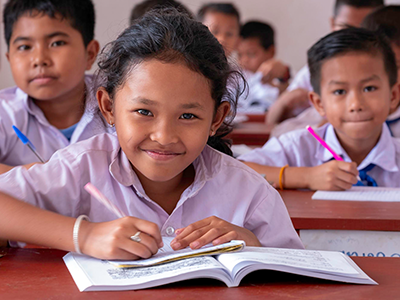Cover image: © UNICEF/UNI280325/Frank Dejongh
This course is available as a complete course and a shorter one. Both are available in four languages:

Complete course:
Short version:
About the course
This course is designed to provide UNICEF staff and partners with an introduction to education in emergencies. The course was originally designed by ESARO, the content has been utilized and updated from existing content from EiE capacity development training (such as for Frontline Responders, INEE Minimum Standards, Risk-Informed Programming, and others) in a comprehensive manner.
Learning objectives
By the end of the course, learners will
- Have a general overview of humanitarian architecture and UNICEF Core Commitments for Children in Humanitarian Action in relation to Education.
- Be introduced to fundamental EiE concepts and education sector coordination mechanisms including needs assessments and response strategies
- Understand the need to build resilient education systems and incorporate key cross-sectoral approaches.
Audience
This course is designed primarily for all UNICEF staff including senior staff members (country offices, regional offices, and HQ). It is also open to partners in country such as government counterparts and cluster members. It is designed for those with little or no experience working on education in emergencies and want to learn more.
Length
It should take you about 2 hours to complete this self-paced course. With an optional assessment at the end to check your knowledge.
Methodology
The course is composed of four modules with text-based and interactive content, and additional resources.
Structure
The structure would be as follows:
- Module 1: Fundamental concepts in Education in Emergencies (EiE)
- Module 2: Technical areas for frontline responders
- Module 3: Rights-based approaches to education and building resilient education systems
- Module 4: Cross-cutting issues
Contact details
Education in Emergencies team, eiecourseadmin@unicef.org, Education Section, Programme Division (HQ).
For technical problems, please contact agora@unicef.org
